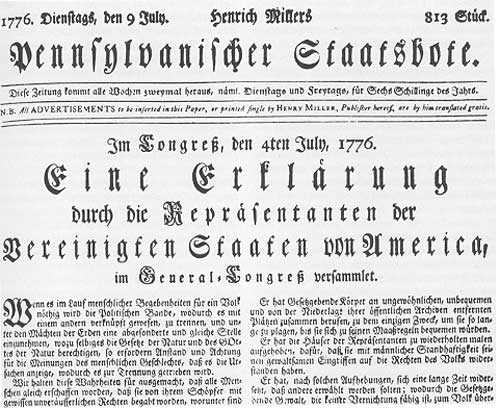July 25, 2006
English under siege in Pennsylvania
More than a third of all Pennsylvanians are native speakers of a language other than English -- and many of them have not even tried to learn English since immigrating, or at least prefer to carry out their daily lives in another language, living together in neighborhoods where their native language dominates. Some people worry that the majority status of English is critically endangered. 25 years ago, a major political figure warned that these "aliens ... will never adopt our language or customs, any more than they can acquire our complexion", and so far, his prediction seems to be right on the money. But wait -- the date is 1776, not 2006, and the language contending with English is not Spanish, it's German, and the major political figure who warned about the "aliens" who "swarm into our Settlements, and by herding together establish their Language and Manners to the Exclusion of ours" is Benjamin Franklin.
The first newspaper announcement of the adoption of the Declaration of Independence was published in German, on Friday, July 5, 1776, in the Pennsylvanischer Staatsbote. On Tuesday, July 9, the same paper devoted its front page to a German translation of the declaration. The picture below is from a web exhibit by the Deutsches Historisches Museum in Berlin:
Linguistic sweetness and light didn't always prevail among the founding fathers. As I mentioned, in 1751 Benjamin Franklin said some things about German immigrants that would put him on the ethnocentric fringe of today's debate. Curiously, in 1732 Franklin had published a German-language newspaper -- though it only lasted for two issues, perhaps because he didn't have a Fraktur typeface, and so had to print his German material in his usual roman-letter Caslon Antiqua. In 1735, Christopher Sauer began publishing in German with the familiar Fraktur letters, and had considerable success with a German-language almanac that had a circulation as high as 10,000, and thus was in implicit linguistic competition with Franklin's English one. Today's readers may be interested to know that Sauer and his newspaper, published since 1739 in Germantown, were socially and religiously conservative supporters of the Penn family, and thus "a thorn in the flesh of any progressive politician in the colonies", especially Franklin.
In 1762 Heinrich Miller (who had earlier worked for Franklin) began publishing the Wöchentliche Philadelphische Staatsbote. Miller's politics were much more to Franklin's taste:
It is Henrich Miller, who gave the German population of the Middle Colonies the opportunity to learn about and to participate in the various political controversies that would gradually lead to independence. He printed in German Jonathan Dickinson's and Joseph Galloway's speeches in Assembly on the change of government in Pennsylvania in 1764, he printed a German version of Benjamin Franklin's interview before the House of Commons concerning the Repeal of the Stamp Act in 1766, and from 1774 on he practically served as official German printer for the First Continental Congress by repeatedly publishing its minutes and votes in German. ... Christopher Sauer in his "Germantowner Zeitung" had taken side against Britain during the Stamp-Act Crisis, but when the course of events led more and more towards armed revolution he had to make amends to the pacifistic convictions of the Brethren and to stay free from radical positions in his publications. This led later to Sauer's being accused as a loyalist and Congress put him under orders to abstain from printing and his whole property was confiscated and put up for auction for the public benefit. His successor, Christopher Sauer III, then actually joined the British side and served as printer to the occupation army in Philadelphia and New York.
In 1776, the difference in political allegation between the two established German presses became evident: while Sauer printed a decisive call for peace and to abstain from armed resistance issued by the Quaker community, Miller printed a pro-congressional pamphlet directed at the German inhabitants under the title "Der Alarm", the Minutes of the Constitutional Convention of Pennsylvania and the Regulations for the Pennsylvania Militia in German.
A number of earlier Language Log posts have focused on America's varied linguistic landscape during its first couple of hundred years. This was never a linguistic garden of Eden -- whatever you think prelapsarian social norms should be like -- but viewed in the light of history, the current anxiety over linguistic identity seems exaggerated. By most measures, English in America seems to be stronger than it's ever been.
"The world is upside down" (2/24/2004)
"When smart people get really stupid ideas" (5/2/2204)
"Palatine Boors and their Maryland descendents" (5/14/2004)
"Mere knowledge of the German language cannot reasonably be considered harmful" (5/21/2004)
"Nativism clings to life at 100 or 101" (6/24/2004)
"The secret Netherlanders among us" (7/2/2004)
"The multilingual anthem" (4/29/2006)
And you may be interested in this essay by Dennis Baron on "The legendary English-only vote of 1795". More on the same topic is found in a chapter "German or English?", from "The German Americans: An Ethnic Experience, by Willi Paul Adams (originally Die Deutschen im Schmelztiegel der USA: Erfahrungen im grössten Einwanderungsland der Europäer).
Posted by Mark Liberman at July 25, 2006 08:08 AM